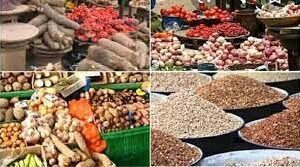By Moses John
Abuja
Regional coordinator, United Nations Environment and Climate Change, Dr. Richard Munang, has called on African governments to put in place mechanisms aimed at ending food wastage on the continent.
Munanag, who made the call at the weekend at the National Day of Resilience and Food security in Nigeria in Abuja, said the continent would save up to 83 billion dollars annually, once it enhance value addition to recover post harvest losses.
He said these post-harvest losses were a result of climate change “which is defining the contours of the continent,” stressing that that “will cause up to 40 per cent yield decline of key staples in Africa.”
Munang, however, urged Africa heads of government to take advantage of the abundant potential aligned with catalytic areas of clean energy and nature-based agriculture to address the challenges.
“The continent is losing the sum of $48 billion annually due to high post-harvest losses; also about $35 billion is spent annually on food importation.
“An agro-value chain can reduce poverty two to four times faster than any other sector which, when amalgamated with clean energy to power agro-value addition industries, can build a $1 trillion agro-sector and create over 17 million jobs along the entire agro-value chain.”
Speaking earlier, President of Ecosystem-based Adaptation for Food Security Assembly (EBAFOSA), James Oyesola, disclosed that about 75 per cent of food produce in Nigeria was wasted.
He said: “Considering the various challenges (climatic and non-climatic), differential impacts and uncertainties in both climate projections and socioeconomic drivers, EBAFOSA Nigeria is focusing on increasing the resilience of agricultural production to climate change.
“Related measures will include building buffers and buffer capacities that enable adaptation, improve self-organisation and grow capacity for learning. Ecological buffer capacity relates to growing crops that are tolerant to the prevailing climatic conditions, adopting better agronomic practices that increase soil moisture-holding capacity (e.g., conservation tillage) and soil erosion protection measures, such as terraces and bunds. Enhancing farmers’ socio-economic buffer capacities would entail increasing their livelihood assets in ways that provide them with necessary human, financial, social, physical and natural capitals by improving their access to markets, information and new technology (ICT).
“EBAFOSA as a robust adaptation implementation framework is also based on information available from vulnerability and impact assessments that seek to determine the extent to which different communities, ecosystems and natural resources are likely to be affected by climate change.”



